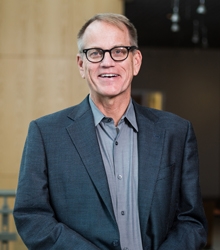Five alumni and health care investors have committed a total of $1.4 million in gifts to launch the Dartmouth Innovations Accelerator for Cancer.
This new initiative will give Dartmouth cancer researchers the support and entrepreneurial guidance needed to bring innovations to the marketplace for the benefit of cancer patients, and provide Dartmouth students with learning opportunities in biomedical entrepreneurship.
“The best, most efficient way for us to bring Dartmouth’s biomedical discoveries to cancer patients around the world is through entrepreneurship,” says Steven Leach, the Preston T. and Virginia R. Kelsey Professor at the Geisel School of Medicine and director of Norris Cotton Cancer Center, which is jointly operated by Geisel and Dartmouth-Hitchcock. A core component of Dartmouth’s The Call to Lead campaign, the Cancer Center aims to transform cancer care on a global scale through next-generation immunotherapy, precision prevention, entrepreneurship, and educating future leaders.

“We are grateful to these visionary alumni who have given of their time, expertise, and philanthropy to help us launch this effort,” says Leach. “Philanthropy can literally accelerate the development of new therapies and diagnostic tools—shaving off years from the pre-clinical and clinical trials timeline.”
A joint initiative of the Cancer Center, Geisel, and Dartmouth’s Magnuson Center for Entrepreneurship, the Accelerator has a goal of raising $15 million in philanthropy by 2022 and is a major priority within The Call to Lead. With this first round of support, the Accelerator will be launched this fall and will sponsor its first projects this academic year. Biomedical research teams will pitch their ideas to a panel of local and national biotech leaders and venture capital investors who will select the most commercially promising projects that address unmet needs.
“Much like the best companies my firm invests in, Geisel and the Cancer Center are deeply committed organizations with a really clear sense of shared purpose, and that’s exciting,” says Todd Sisitsky ’93, chair of the Geisel Board of Advisors and managing partner at the investment firm TPG Global, where he has overseen healthcare investments of more than $12 billion.
Sisitsky is one of five alumni leaders who have stepped forward to launch this effort with their personal philanthropy. He is joined by fellow alumni and healthcare investors Hoyoung Huh ’91, founder of Healthcare & Humanity Foundation; Ross Jaffe ’80, co-founder and managing director of Versant Ventures; Stephen Bloch ’84, CEO of EvolveImmune Therapeutics and general partner of Canaan Partners; and Steven Rodgers ’93, head of healthcare investing for Morgan Stanley Capital Partners.
This team is building a network of alumni leaders and donors who will support the Accelerator through their professional engagement and personal philanthropy.
The Accelerator builds on three decades of entrepreneurial successes and innovations coming out of the Cancer Center. The oldest and most successful Cancer Center spinoff is Medarex, which developed the first approved immunotherapies for cancer and was purchased by Bristol Myers Squibb for a record price in 2009. Royalties from the sale of Medarex benefit Dartmouth researchers today in the form of grants supporting early-phase, highly innovative research at Geisel.
Fourteen start-ups have their roots in the Cancer Center, many of which received early support in the form of pilot grants funded by donations from individual donors, foundations, and The Prouty—the Cancer Center’s signature community fundraising event.
“We are launching the Accelerator through philanthropy. But our goal is to work toward a model where the Accelerator will eventually support itself as proceeds from these innovations flow back to the institution,” says Jamie Coughlin, director of the Magnuson Center. “This is a well-established evergreen approach to investing, and now is the time to build this at Dartmouth.”


